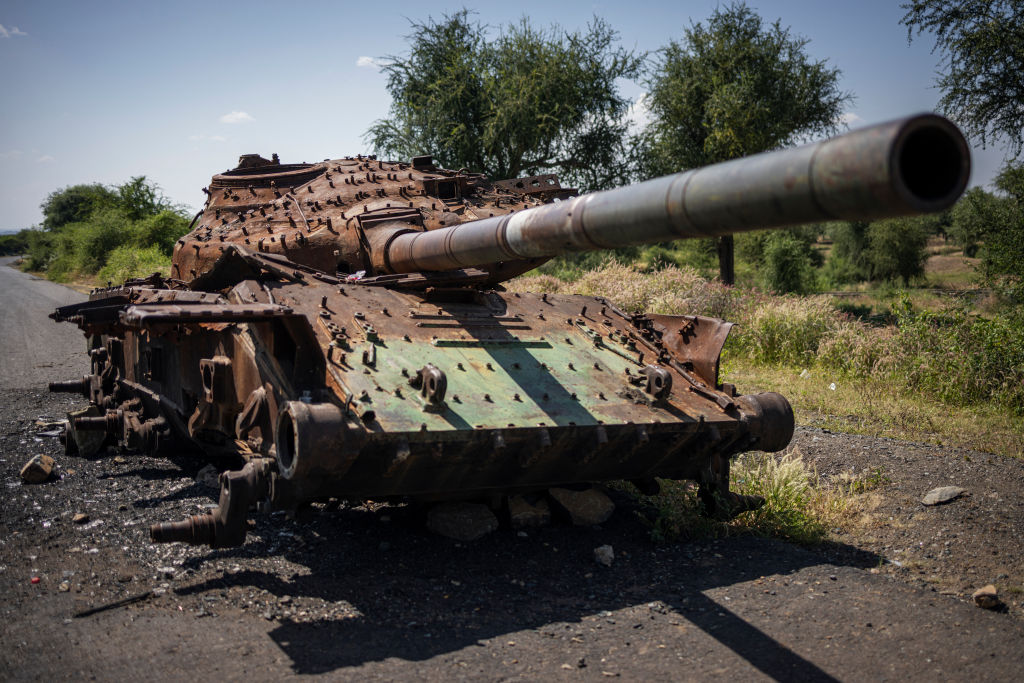For most people in the volatile Tigray region, the two-year war fought against Ethiopian federal forces with support from the Eritrean Army didn’t really end with the Pretoria peace agreement in November 2022.
“What was left of the Pretoria Agreement’s security framework is rapidly collapsing, with former comrades-in-arms now clashing, civilians again fleeing in fear, and Addis Ababa’s authority in the region becoming increasingly tenuous,” columnist Hafed Al-Ghwell wrote in a March 29 opinion piece for the Arab News daily newspaper.
The instability has observers fearing that Ethiopia’s northern neighbor will increase its involvement militarily.
“Neighboring Eritrea is watching these developments with growing alarm — and, naturally, some sense of opportunism.”
The failure to implement most of the ceasefire’s provisions caused a split in the Tigray People’s Liberation Front (TPLF). In March, a faction aligned with former regional President Debretsion Gebremichael seized several provincial government offices and the mayor’s office and the main radio station in Tigray’s capital, Mekelle.
Getachew Reda, leader of the region’s interim administration, fled to Addis Ababa and called the rival group’s actions an “open coup.” He also accused Debretsion of colluding with Eritrea in a March 13 statement.
“We have reason to believe external actors are involved,” he said, accusing Eritrea of being among those who think “they would benefit from turmoil in Tigray.”
Ethiopian Prime Minister Abiy Ahmed confirmed Getachew’s removal on March 26 and called on Tigrayans to nominate a new interim president.
Gen. Tsadkan Gebretensae, a vice president of the Tigray Interim Administration who was formerly chief of staff of the Ethiopian National Defense Force (ENDF), further fanned the flames when he wrote a commentary for The Africa Report on March 10:
“At any moment war between Ethiopia and Eritrea could break out. … Preparations are in their final stages. The nature of preparations for war is such that after a certain stage of the process, it becomes very hard to hold it back.”
The Tigray War killed an estimated 600,000 people and displaced millions. Continuing instability and the failure of the Pretoria Agreement to settle disputed territory between Tigray and Amhara mean that as many as 1 million Tigrayans still live in displacement and refugee camps.
The Eritrean military, which was accused of committing war crimes against ethnic Tigrayans during the war, still holds some of the border towns in Ethiopia’s Irob district in northeastern Tigray.
In February, the government called up reservists and issued military mobilization directives to citizens under 60 years old. The organization Human Rights Concern Eritrea (HRCE) labeled it forced conscription by the authoritarian government.
“This sudden and unprecedented mobilization has sent shockwaves through Eritrean society, as it is assumed that the war could be with neighboring Ethiopia,” the HRCE report stated.
In early March, Ethiopia reportedly deployed federal forces and tanks along its northern border with Eritrea. Analysts believe that the buildup, coupled with large-scale drone manufacturing efforts, suggest that Abiy’s administration is preparing for a potential escalation.
An additional factor escalating tensions is Ethiopia’s effort to regain access to the Red Sea, which it lost when Eritrea fought for and won independence in 1993. Abiy recently made assurances that he has no plans to invade Eritrea, but in 2023 he said it is “an existential matter” for the world’s most populous landlocked nation to have access to the sea.
“Both countries appear to be on a war footing,” the Crisis Group wrote in a March 27 report. “Regional diplomats who monitor rumblings in Addis fret that Ethiopia could soon do so, moving into and annexing the Eritrean port of Assab, casting aside norms against redrawing borders by force, and pushing the Horn into yet another conflagration.”
Another factor is the Tigray Defense Forces, still a capable military force with more than 200,000 troops. The split in Tigrayan leadership deepened when Getachew suspended and attempted to remove three generals he suspected of aligning with Debretsion.
For now, Tigray’s internal power struggle continues in a somewhat isolated fashion. But Hafte Gebreselassie Gebrihet, a postdoctoral research fellow at the Nelson Mandela School of Public Governance at the University of Cape Town, said that with Ethiopian and Eritrean forces massing, the Horn of Africa must hold its breath.
“Any renewed conflict would be devastating for all parties involved, with civilians bearing the brunt of the suffering,” he wrote in a March 16 opinion piece for South African newspaper Daily Maverick. “The longer these tensions worsen, the closer the region inches toward catastrophic violence that no actor can truly control.”

